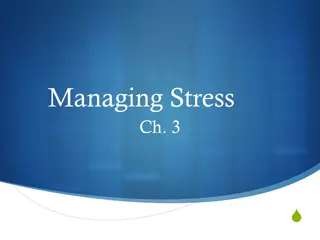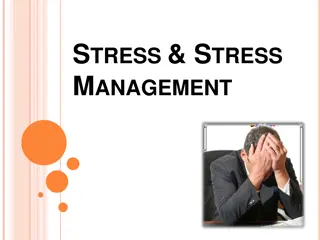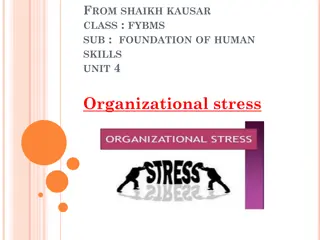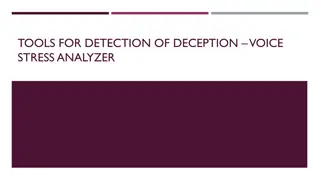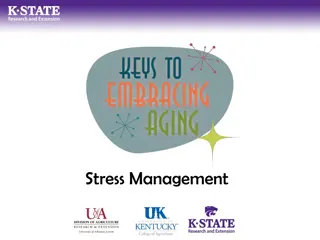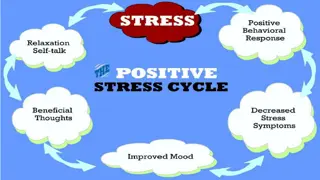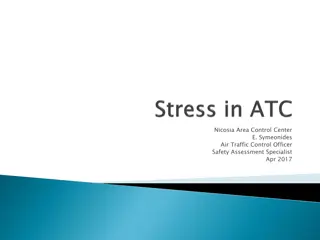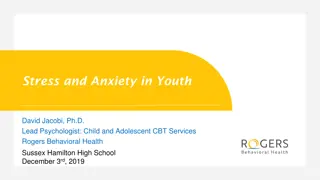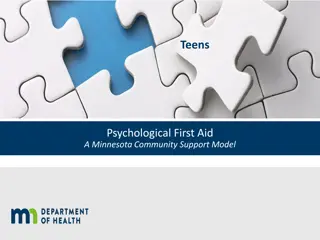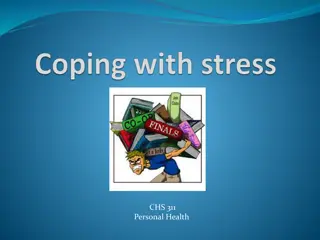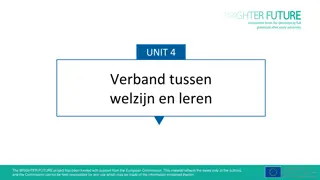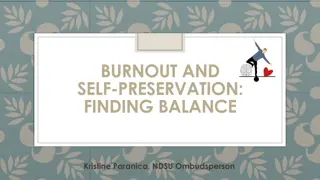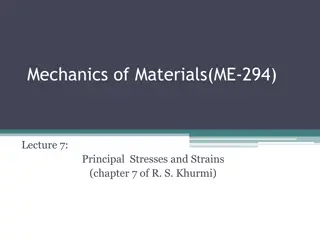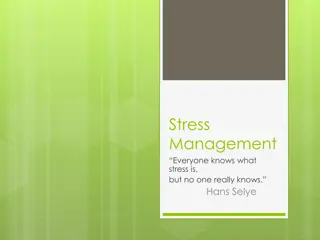Stress and Learning for a Better Tomorrow
In this insightful presentation, Kristen Dickerson, Ph.D., sheds light on the impact of stress on learning for a brighter future. Delve into strategies to manage stress effectively and optimize your learning potential to pave the way for a successful tomorrow. Discover the crucial link between well-being and academic performance, and unlock the tools to enhance your overall health and productivity.
Download Presentation

Please find below an Image/Link to download the presentation.
The content on the website is provided AS IS for your information and personal use only. It may not be sold, licensed, or shared on other websites without obtaining consent from the author. Download presentation by click this link. If you encounter any issues during the download, it is possible that the publisher has removed the file from their server.
E N D
Presentation Transcript
Stress: Learning Today for a Better Tomorrow Presented by: Kristen Dickerson, PhD, MPH, RN, MLT(ASCP) Statewide Health, Wellness, and Special Programs Manager-BWC
Current situation Types of stress Symptoms of stress Stress Management Objectives Toolkit Mindfulness Health and Wellness Teleworking tips
Pandemic Teleworking Isolation Possible illness Traumatic event Current Situation CHANGE Children at home Job status and security Routines and schedules Economy How we interact with people
Emotional or physical tension Is a normal feeling Your bodies reaction Challenge Demand Stress Acute or chronic Stressor Anxiety
Acute Stress Short term stress Least damaging Can be positive Most Common Examples WebEx not working Call in number is wrong Late for a meeting Stress
Chronic Stress Long term stress Emotional pressure Individual feels they have no or little control Association with traumatic events Chemicals in the body are released Corticosteroids Norepinephrine/epinephrine Build up over time Flight or fight all the time Stress
Stress Impacts of Chronic Stress High blood pressure (stroke) Damage to muscle (heart attack) Growth inhibition Suppress the immune system Anxiety, depression Headaches Sleep problems Concentration problems Weight gain
Change in bowel habits Trouble sleeping/sleeping too much Upset stomach Use of drugs or alcohol Symptoms Change in weight Forgetfulness Tiredness Inability to concentrate
Classifications Routine Change Traumatic event
Feelings you may be experiencing Sadness Guilt Loneliness Isolation Fear Anger Despair Panic Anxiety Confusion Your Feelings IT S OK TO HAVE THESE FEELINGS Everyone is experiencing similar feelings right now Time for processing
Managing stress Be observant Talk to your provider
Regular exercise 30 minutes a day Help boost your mood Helps you sleep better Relaxing activities Meditation Breathing exercise Mindfulness Managing stress
Stress management Eat healthy 5 fruits and veggies a day More food cooked at home Sleep well Develop a sleep routine Stop electronics 60 minutes prior to bed Keep your bedroom for sleeping
Managing stress Set goals and priorities Say no Note what you have accomplished Stay connected Stay connected Consider community groups
Be positive Assertive Accept that you can not control everything Write your feelings down Celebrate the small stuff Managing Stress
Toolkit: the four As Avoid Take control of surroundings Avoid people Say no Ditch the list
Toolkit: the four As Alter Ask for a change Communicate feelings Manage time better Limits in advance
Toolkit: the four As Accept Talk to someone Forgive Positive self-talk Learn from mistakes
Toolkit: the four As Adapt Adjust standards Thought stopping Rethink the issue Adopt a mantra Create an assets column Look at the big picture
Thought Break Think about it A true example What A would work
Quality of being aware Mental state Focus awareness Accept feelings Mindfulness
Mindfulness Aware of your thoughts Stop immediate reaction Being Mode Aware of your needs
Aware of emotions Compassion Mindfulness Reduces brain activity Better able to focus Switch your attitude to stress
Live mindfully Mindful wakeup Mindful eating Mindful pause Mindful workout Mindful driving
Yawn and stretch Three hugs, three breaths Stroke your hands Mindfully eat Minute Activities Clench and breath STOP Breath for a minute Love/kind Aspirations
Create new routines Take time to disconnect Health and Well Being It is ok Accept negative emotions Write down your feelings Schedule this every day: i.e.. take a walk, facetiming with friends, draw, listen to music Remember self care Play games with family inside or out Play Use this time to connect with family
Meditate Complete mindful activities Health and Well Being Reduce exposure to social media Avoid complaining and gossiping You invite criticism and unwanted advice You increase negative stress hormones
Have a morning routine Try to have a schedule for you and children Engage when you can by video Tips for Teleworking Schedule breaks Get outside or at least leave your office space
Have a firm quitting time Your office space is your office space Tips for Teleworking Only work from this space The rest of your house should remain work free When possible, the workplace should be outside of your bedroom Share thoughts with co-workers
here here here Click here for the Adult Resource page that the state has prepared. Click here to be taken to the CDC website about managing stress and anxiety during the pandemic. Click here to be taken to the CDC website about dealing with a traumatic event. There is information about mental health services, recovery and addiction support, health and fitness information, and resources for financial concerns as well. It also offers resources for others in your family. It offers information to help with children that may be experiencing stress as well. Resources here Click here to see SAMHSA and their information about mental wellbeing during an infectious disease outbreak. here Click here to watch a video that discusses stress and management. They also have provided information here about dealing with a traumatic event. here
here here here here Click here for information about sleep Click here for information about nutrition Click here for information about physical activity Click here for more information about Mindfulness Resources
Kristen Dickerson K.dickerson.1@bwc.state.oh.us Questions Office: 614-466-7053 Cell: 614-512-2842
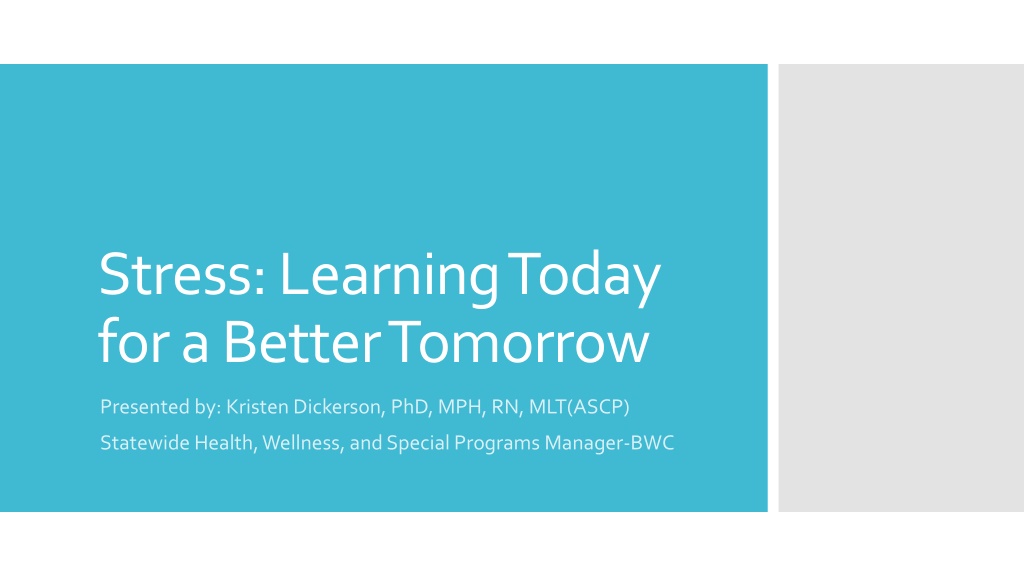
 undefined
undefined








